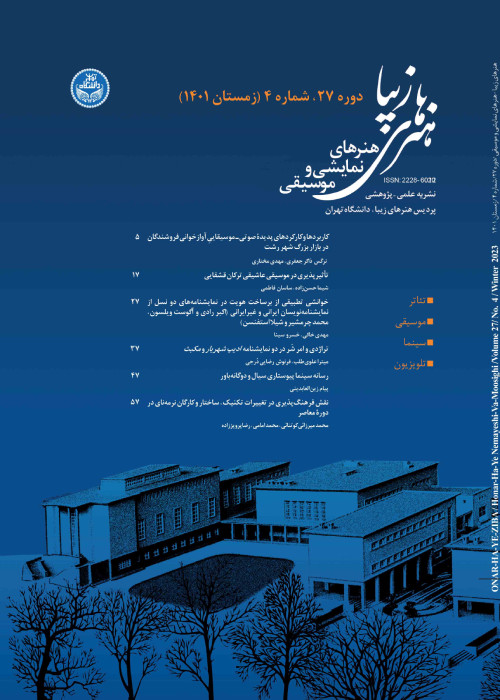Retracing the Origin of Two Pieces from the Old Arab School for " Oud"
Author(s):
Abstract:
An attempt is made here to analyze and transcribe two pieces for solo Oud by Jalal ed-Din Ormawi, a 13th-century Iranian musician, which has been originally transcribed in “Abjad” system of notation. Using such terms as “Mujannab”, “Mutlagh” and “Tarigh” in the titles of these pieces is an eloquent instance of a different style of titling as compared to his other pieces. Considering the principle that the title reveals the rhythmic pattern of the melody and the modal structure of the piece, the estrangement of using the two terms “Mujannab” and “Mutlagh” to title pieces in the newborn “systematic” school leads on the assumption that these two pieces are of a different essence. This article seeks to uncover the true ideology behind these two pieces through analyzing and transcribing them under the modern system of notation. In that way the meaning of the terms “Mujannab”, “Mutlagh” and “Tarigh” such as well known rhythmical patterns “Ramal” and “Thaghil al-Awwal” are the main items of this research. The methodology to this end calls for reference to prominent historical literature in diverse and variant treaties and studying other secondary related official articles such as those by E. Neubauer and O. Wright. To demonstrate the 6. tetrachord spices, namely "6. Mawajib", Jalal ed-Din himself combines Oud frets as an alternative old traditional way in “Risala al-Sharafiye”. This practical method reminds us of the modal terminologies such as “Mutlagh”, “Mazmum”, “Mahmul”, … based on the position of the left hand fingers on Oud frets as used by the well-known Iraqi and Egyptian musicians Hasan Ibn al-Katib and Ibn al-Tahhan al-Musighi in the 11th century. However, in the treaty “Adab al-Ghina”, Ibn al-Katib describes the “three Genera” in the same way as Farabi in “Musighi al-Kabir”. The combination of the principle of the 4.Modes (Asabi’ al-Arbi’) and the modification of the melody throw the “three Genera” prove the identity of the prototypes showed in resolution with the “6. Mawajib”. It is now clear that discussing unknown Oud melodies survived from the old Arab school of using practical method of modifying the melodic modes is based on fingerings on the Oud frets and old terminologies like “Mujannab” and “Mutlag”. Also, modal definitions of the two pieces are related to the descriptions of the “6. Mawajib” given by Jalal ed-Din himself. Furthermore the term “Tarigh” sets its roots in an old persian musical method of composing named “Rah”. Yet the transcription of the “Abjad” system to the modern notational style and analysis of the modal structures fails to clarify the exact relation between the meaning of the terms “Mujannab”, “Mutlaq” and the pieces’ content. It is finally concluded that these two pieces originally come from some old Arab schools of music. Also the descriptive function of these titles, especially in the rhythmic patterns, is made clear with still uncertainty of the functionality of the terms “Mujannab” and “Mutlagh” in describing the modal and melodic structure and is applied to the piece only based on assumptions.
Keywords:
al , Asabi al Satte , Mujannab , al , Ramal , Tarigh , Thaghil al Awwal , Mutlagh
Language:
Persian
Published:
Honar-Ha-Ye-Ziba: Honar-Ha-Ye Mosighi Va Namayeshi, Volume:17 Issue: 45, 2012
Page:
5
magiran.com/p1093941
دانلود و مطالعه متن این مقاله با یکی از روشهای زیر امکان پذیر است:
اشتراک شخصی
با عضویت و پرداخت آنلاین حق اشتراک یکساله به مبلغ 1,390,000ريال میتوانید 70 عنوان مطلب دانلود کنید!
اشتراک سازمانی
به کتابخانه دانشگاه یا محل کار خود پیشنهاد کنید تا اشتراک سازمانی این پایگاه را برای دسترسی نامحدود همه کاربران به متن مطالب تهیه نمایند!
توجه!
- حق عضویت دریافتی صرف حمایت از نشریات عضو و نگهداری، تکمیل و توسعه مگیران میشود.
- پرداخت حق اشتراک و دانلود مقالات اجازه بازنشر آن در سایر رسانههای چاپی و دیجیتال را به کاربر نمیدهد.
دسترسی سراسری کاربران دانشگاه پیام نور!
اعضای هیئت علمی و دانشجویان دانشگاه پیام نور در سراسر کشور، در صورت ثبت نام با ایمیل دانشگاهی، تا پایان فروردین ماه 1403 به مقالات سایت دسترسی خواهند داشت!
In order to view content subscription is required
Personal subscription
Subscribe magiran.com for 70 € euros via PayPal and download 70 articles during a year.
Organization subscription
Please contact us to subscribe your university or library for unlimited access!


